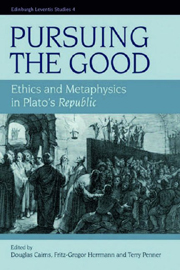Book contents
- Frontmatter
- Contents
- Preface
- Contributors and Editors
- Introduction
- 1 What is the Form of the Good the Form of? A Question about the Plot of the Republic
- 2 Glaucon's Challenge, Rational Egoism and Ordinary Morality
- 3 Thrasymachean Rulers, Altruistic Rulers and Socratic Rulers
- 4 Neutralism in Book I of the Republic
- 5 The Good, Advantage, Happiness and the Form of the Good: How Continuous with Socratic Ethics is Platonic Ethics?
- 6 The Form of the Good and the Good in Plato's Republic
- 7 Flourishing: The Central Concept of Practical Thought
- 8 Is Plato's Conception of the Form of the Good Contradictory?
- 9 The Good, Essences and Relations
- 10 The Idea of the Good and the Other Forms in Plato's Republic
- 11 The Aporia in the Charmides about Reflexive Knowledge and the Contribution to its Solution in the Sun Analogy of the Republic
- 12 The Good and Mathematics
- 13 The Good and Order: Does the Republic Display an Analogy Between a Science of Ethics and Mathematics?
- 14 Inquiry and Justification in the Search for the Highest Good in Plato and Aristotle
- 15 The Carpenter and the Good
- 16 Conversion or Conversation? A Note on Plato's Philosophical Methods
- Index
2 - Glaucon's Challenge, Rational Egoism and Ordinary Morality
Published online by Cambridge University Press: 12 September 2012
- Frontmatter
- Contents
- Preface
- Contributors and Editors
- Introduction
- 1 What is the Form of the Good the Form of? A Question about the Plot of the Republic
- 2 Glaucon's Challenge, Rational Egoism and Ordinary Morality
- 3 Thrasymachean Rulers, Altruistic Rulers and Socratic Rulers
- 4 Neutralism in Book I of the Republic
- 5 The Good, Advantage, Happiness and the Form of the Good: How Continuous with Socratic Ethics is Platonic Ethics?
- 6 The Form of the Good and the Good in Plato's Republic
- 7 Flourishing: The Central Concept of Practical Thought
- 8 Is Plato's Conception of the Form of the Good Contradictory?
- 9 The Good, Essences and Relations
- 10 The Idea of the Good and the Other Forms in Plato's Republic
- 11 The Aporia in the Charmides about Reflexive Knowledge and the Contribution to its Solution in the Sun Analogy of the Republic
- 12 The Good and Mathematics
- 13 The Good and Order: Does the Republic Display an Analogy Between a Science of Ethics and Mathematics?
- 14 Inquiry and Justification in the Search for the Highest Good in Plato and Aristotle
- 15 The Carpenter and the Good
- 16 Conversion or Conversation? A Note on Plato's Philosophical Methods
- Index
Summary
In his inaugural lecture ‘Duty and interest’ delivered in 1928, Prichard singled out for criticism a theme which, he believed, pervaded many ethical theories, both in ancient times and in his more immediate predecessors. Among philosophers, wrote Prichard, Plato is far from being alone in presupposing that an action, to be right, must be for the good or advantage of the agent (2002: 26). After spending a few sentences on Cook Wilson and Butler, he resumes:
Nevertheless, when we seriously face the view that unless an action be advantageous, it cannot really be a duty, we are forced both to abandon it and also to allow that even if it were true, it would not enable us to vindicate the truth of our ordinary moral convictions. (2002: 27)
Later in the same lecture, he writes that he will now take it as established
that (1) both Plato and Butler in a certain vein of thought are really endeavouring to prove that right actions, in a strict sense of right actions, will be for the agent's advantage; (2) that their reason for doing so lies in the conviction that even where we know some action to be right, we shall not do it unless we think it will be for our advantage; and (3) that behind this conviction lies the conviction of which it is really a corollary, viz. the conviction that desire for some good to oneself is the only motive of deliberate action. (2002: 35)
- Type
- Chapter
- Information
- Pursuing the GoodEthics and Metaphysics in Plato's Republic, pp. 42 - 60Publisher: Edinburgh University PressPrint publication year: 2007



